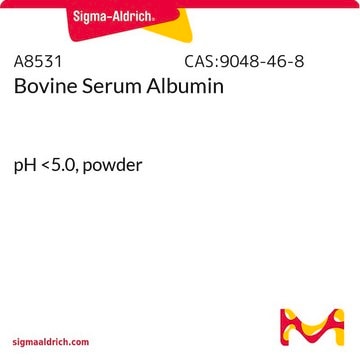1.15444
Coomassie Brilliant blue G 250 (C.I. 42655)
for electrophoresis
Synonym(s):
Coomassie Brilliant blue G 250 (C.I. 42655), Acid blue 90, Brilliant Blue G, Cyanine G, Polar Blue G, SERVA BLUE G, protein gel stain
About This Item
Recommended Products
Quality Level
potency
>5000 mg/kg LD50, oral (Rat)
technique(s)
protein staining: suitable
pH
6.4 (20 °C, 10 g/L in H2O)
solubility
40 g/L
bulk density
520 kg/m3
storage temp.
no temp limit
InChI
1S/C47H49N3O7S2.Na/c1-6-49(31-35-11-9-13-43(29-35)58(51,52)53)40-21-25-45(33(4)27-40)47(37-15-17-38(18-16-37)48-39-19-23-42(24-20-39)57-8-3)46-26-22-41(28-34(46)5)50(7-2)32-36-12-10-14-44(30-36)59(54,55)56;/h9-30,48H,6-8,31-32H2,1-5H3,(H-,51,52,53,54,55,56);/q;+1/p-1
InChI key
CMGWKYXJIYYESN-UHFFFAOYSA-M
Related Categories
General description
Application
Analysis Note
Absorption maximum λmax. (buffer pH 7.0): 577 - 584 nm
Spec. Absorptivity A 1%/1cm (λmax; 0.01 g/l; buffer pH 7.0; calc. on dried substance): 450 - 570
TLC-Test: passes test
Loss on drying (110 °C): ≤ 8 %
Suitability for electrophoresis: passes test
Legal Information
Storage Class Code
11 - Combustible Solids
WGK
WGK 3
Flash Point(F)
Not applicable
Flash Point(C)
Not applicable
Certificates of Analysis (COA)
Search for Certificates of Analysis (COA) by entering the products Lot/Batch Number. Lot and Batch Numbers can be found on a product’s label following the words ‘Lot’ or ‘Batch’.
Already Own This Product?
Find documentation for the products that you have recently purchased in the Document Library.
Customers Also Viewed
Our team of scientists has experience in all areas of research including Life Science, Material Science, Chemical Synthesis, Chromatography, Analytical and many others.
Contact Technical Service







